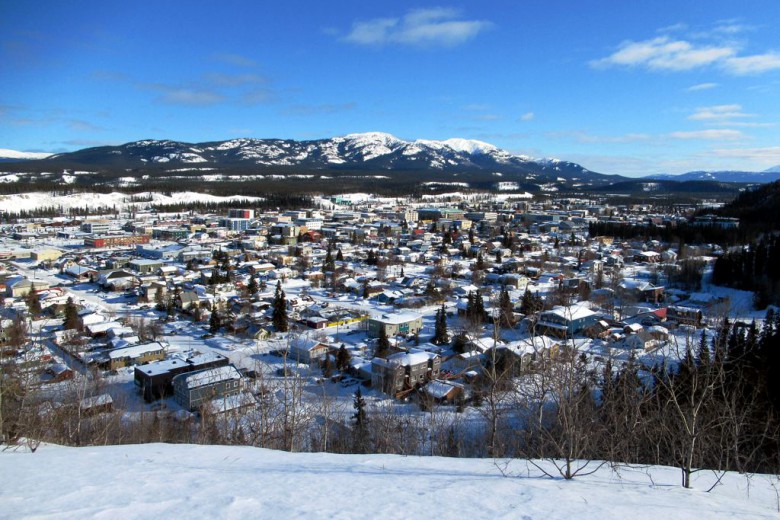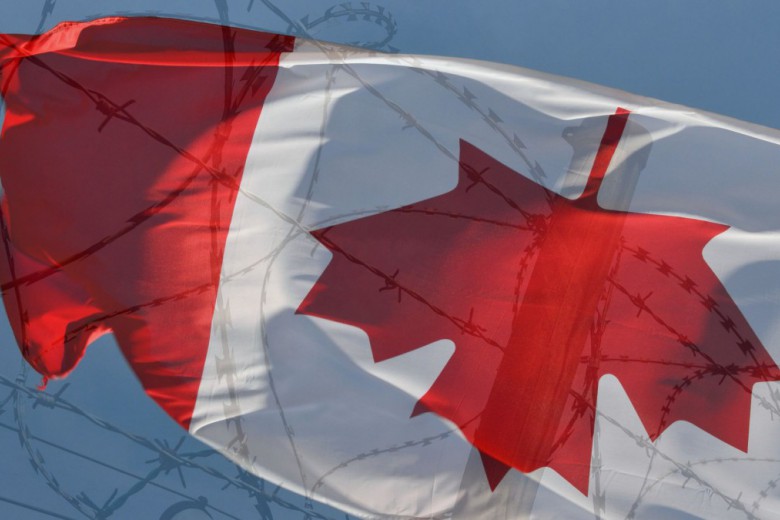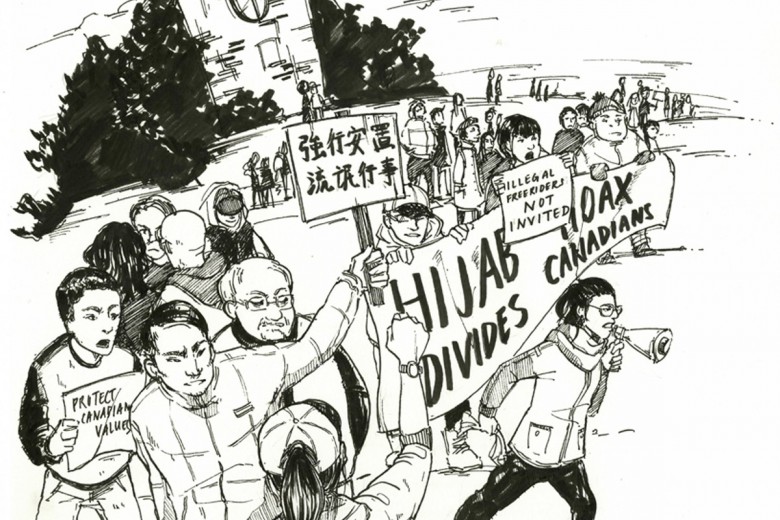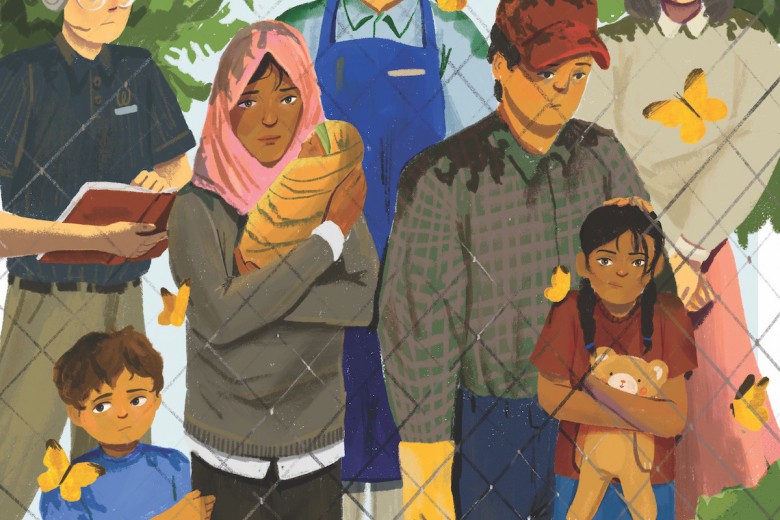_744_1024_90.jpg)
“Will I tell you that my suitcase is filled with terror and courage, sadness and joy? Yes, I will tell you because these are the tools of survival and resistance [...] – the common threads of political conviction and action, strength in cultural identity combined with a vision of humanity. These tools are part of my migration.” - Amy Gottlieb, pictured, explores her connections to her diasporic Jewish internationalist kin in “Soul Migrations”
Since leaving was never voluntary, return was, and still may be, an intention, however deeply buried. There is as it says no way in; no return.
– Dionne Brand, A Map to the Door of No Return: Notes to Belonging
This second position recognises that, as well as the many points of similarity, there are also critical points of deep and significant difference which constitute ‘what we really are’; or rather - since history has intervened – ‘what we have become.’ We cannot speak for very long, with any exactness, about ‘one experience, one identity’, without acknowledging its other side – the rupture and discontinuities […] Cultural identity, in this second sense, is a matter of ‘becoming’ as well as of ‘being’. It belongs to the future as much as to the past. It is not something which already exists, transcending place, time, history and culture.
– Stuart Hall, “Cultural Identity and Diaspora”
Diaspora. A wild and surprising formation of people, diaspora is as much about surprise as it is about longing, yearning, and displacement. Diaspora is about that which we have not yet thought or can bear to think at the moment, at any moment about our origins.
Jews and Black people share the condition of diaspora, some would say most powerfully of all the diasporas that now exist. Others would insist that Jews, as the original diasporic people, have lent the world the word for the complex condition of what it means to be displaced from an original homeland. Because Jews and Black people are not the only diasporas and the word and its now many meanings mark many kinds of displacement, exiles, expulsions, voluntary migrations (like labour migrations), and/or planned and unplanned movements, what constitutes a diaspora in its primary and its secondary forms, as Robin Cohen distinguished them, has become infinitely complex. But what always sits at the heart of diaspora is an imagined homeland and concomitantly a desire to return to that homeland even when it is clearly impossible to do so.
Diaspora returnees to promised lands bring with them a dark and violent side with which we have yet to fully reckon, but we see this being played out in the theatre of Israel and Palestine today.
Different diasporas have come to reconcile their relationship to the imagined homeland in a number of different ways. For many Black diaspora people, the homeland exists only as a kind of origin that is acknowledged but no longer yearned for. For others, it functions as a kind spiritual calling and leads to sojourns of various kinds. And yet for others it is a strong pull to eventually and actually return and make it home again. All these and more orientations to the original homeland are legitimate ways to make sense of one’s diaspora experience and sensibility. However, actual returns to homelands for many dispersed people have often proved to be difficult returns. The notion of leaving, even when brutal, turns out to be “easier” than returning and the reality has become a maxim of diaspora sensibilities and rhetoric (“You can leave but can you return?”). Indeed, no matter the reasons that one becomes part of a diaspora, the time between being away and the potential time of return produces a disjunctive experience because the place of dispersal never stays the same as when the initial dispersal occurred. Time does not stand still in the diaspora, nor does it in the homeland regardless of the desires of those dispersed. Thus, the fantasy of return has to always in some way invent narratives that hold the homeland in place at the alleged time of dispersal.
***
The Israeli Zionist state is premised and founded on the idea of the return of the Jewish diaspora in the most basic fashion of return narratives. Jews from all over the world are technically welcomed by the Israeli state and offered citizenship. Of course, such a welcome is never straightforward. Indeed, which Jews are welcomed has been heatedly debated when those Jews are African and/or non-white. Nonetheless, the premise of Jews from everywhere beyond Israel being welcomed is the foundational claim of the Zionist state. The identified bordered state of Israel as a Jewish homeland is the first difference between the Jewish diaspora and the Black diaspora. The Black diaspora technically claims all of Africa as its homeland and thus is not bounded by a bordered nation-state. Indeed, while the discrepant nature of Black diaspora cultures have claimed Ethiopia like in Rastafari cultures, the Black diaspora is largely imagined to be located as a dispersal from West Africa – a region marked now by nation-states. At the time of the long dispersal into transatlantic slavery however, it was not identified as nation-states since the modern nation-state itself evolves out of the conditions that helped to produce African slavery in the first instance. So, while Zionists insist there can be something called the Jewish state where all Jews can return to, there can be and is no such thing as the Black state where all Black people can return to. There is no right of return for Black people as such, then.
Nonetheless, Black diaspora subjects have sought a return to Africa and to create a state there. And furthermore, their former enslavers have sought to expel them to Africa, where it was understood they naturally belonged. There are at least three African spaces that stand out for this kind of emigrationist politics and practice – Liberia, Sierra Leone, and Ethiopia. In each instance, the ability to establish a site of return simply fails. Liberia was deliberately colonized and carved out as a space to create a homeland for former slaves and other freed Black people. The return led to the creation of hierarchies of culture, class, colour, and other social signifiers that distinguished the returnees from the natives already there. Indeed, the returnees were positioned to rule over the populations whose lands they came to occupy. The American colonist movement failed in its anti-Black racist attempt to ship Black people back to Africa in the 1800s. This disjunctive return of Liberian-Americans has had a long and enduring impact on that society from the 1820s to the present, and that impact includes war.
If we are to break with the violences instituted for managing the species post-Columbus, then we will inevitably have to break with the desire, indeed the demand, for a nation-state and for the sovereignties of all kinds that flow from it.
However, by and large, any attempt by the Black descendants of transatlantic slavery to fully return to an African homeland and state has simply failed. The Rastafarian return to Ethiopia in the 1960s largely petered out; Sierra Leone also found itself plagued with Creole superiority issues, which shaped the society in ways that remain deeply problematic – with the returnees being favoured vis-à-vis the African populations already there. In each case, violence accompanied the return and shaped practices of dominance in the society. What the African examples demonstrate is that the politics of diaspora return are deeply problematic and that diaspora imaginaries find it difficult to address because the post-Enlightenment project has insisted that all people have a homeland, belong to a specific geography, and that those things define who we are in the world. It is this fundamental belief that requires urgently rethinking in a post-Columbus late modern world after the planned and unplanned movements of colonization have reshaped our species life. Further, it is this idea that helps produce a dark side to diaspora.
***
If you think my insistence on a dark side of diaspora is incorrect or misguided, think of how the revered and indeed transformational Marcus Garvey would meet with the Ku Klux Klan. One cannot assail Garvey’s skill and intellectual capabilities for galvanizing elements of the Black diaspora into a formidable force for return to Africa via his Black Star Line project, an endeavour that outlived him. But one wonders about how a particular kind of fervour could lead to such an encounter, such a meeting, and even a fascination with the Klan.
Indeed, we can see the corollary today, when Israeli state officials find themselves in bed with white fascists based on their mutual hatred of Muslims and Arabs. This dark side to diaspora is often what many diasporians find difficult to think about; we are much more willing to celebrate diaspora survival and resistance than its potential chauvinisms. In a chapter in Against Race titled “Hitler Wore Khakis: Icons, Propaganda, and Aesthetics Politics,” cultural theorist Paul Gilroy angered some in Black studies when he linked Garvey’s aesthetics and Hitler’s. Garvey’s enduring impact on Black global life, while important, should not prohibit us from making connections that can help us think of new modes of life beyond those conditioned by Euro-American late modern thought of what or how a life should be lived. Central to this idea is not only the aforementioned idea that we all naturally belong to a place, a specific geography that makes all people who we are, but also that the highest manifestation of that belonging is achieved through a nation-state and sovereignty.
I argue that the nation-state and desires for it foment all the late modern violences that shape our planetary life today and that diaspora peoples are susceptible to imbibing those violences as a way to make their way in the world.
At the heart of diaspora is an imagined homeland and concomitantly a desire to return to that homeland even when it is clearly impossible to do so.
I began with a brief meditation on diaspora because I want to insist on and explore further its dark side – where those who imagine, fashion, and wish for return can often bring with them, or imagine for themselves, a kind of superiority to those who never left, as in the history of Liberia and Sierra Leone. Indeed, the uncomfortable truth of the failures of Liberia and Sierra Leone is that the returnees, once touched by their proximity to Western life, thought themselves more worthy leaders of the Africans whose lands they came to occupy. There is, then, this strange inverse that despite the pain of having left, the leaving has now provided the potential returnees with a better insight into what the community is and can be. A kind of arrogant ambiguous situation develops from having left, which produces a condition that can find itself transformed into relations of domination and a desire to frame the present and the future on the terms of the returnees.
The problem of Indigeneity and diaspora on the terms that I am pursuing only becomes necessary to be named in the face of colonial conditions of displacement, extraction, and death. We develop these forms of naming, or these forms of naming are thrust upon us because the colonial project has been executed on us. Those forms of naming come after the violent encounter and often are tied to that encounter, keeping in place the dynamics of domination and subordination even when it seems like such naming is in fact a form of resistance. The contradictions of how we account for colonization and resistance to it are often blurred by having to use the master’s tools to seek a measure of legibility. In short, so many of the categories that flow from post-Columbus, European Enlightenment and post-Enlightenment and late Euro-American ideologies continue to be the terms on which we challenged their violent hegemony. We, the oppressed and subordinated, speak their language to resist them, and we fail at it in the process. How do we break out of that self-defeating embrace?
We will have to risk giving up on many things that we are told by the self-same oppressor will eventually make us human but that we only fail at continuously. I suggest that one of the principal risks we must take is to give up on the desire for nation-state and its accompanying claims of sovereignty. I know that some will find this a controversial or disturbing claim, but for those of us who ultimately desire a borderless world, the nation-state paradigm is the biggest obstacle to its achievement.
Anti-Zionist Jews dismantle the nation-state in their insistence that the state of Israel does not make them safe, but that they should be safe wherever it is they are landed.
Diaspora does something powerful to the idea of the nation-state. It breaks up the idea that people naturally belong to specific geographies that make them who they are. It breaks up the idea that nations and states are ethnically homogenous. It also breaks up the idea that a desire for another homeland means a literal return to it. Diaspora reorients what it means to land somewhere and to belong to a polity or community not defined by a state. Diaspora does something to how we think about apportioning the Earth as a site of residence and habitation. Diaspora, in its most enlivened sense, is against property and ownership of land, resources, ethnicity, and the social foundations of what makes the species. Diaspora unravels post-Enlightenment racial hierarchies and taxonomies. Diaspora is a wild card in the game of life.
The nation-state and claims to land are not coterminous with freedom or its more limited form, a claim to justice. Scholars like Nandita Sharma have warned us against seeing the state, nation, and sovereignty and achieving them as a form of freedom rather than yet another tool for managing populations. I would further add that desires to achieve a nation-state, to claim land under late capitalism and white supremacist global rule once history has intervened – to borrow Stuart Hall’s phrasing – locks us into the logic of Euro-American violences and their repetition. The nation-state form that is inherited post-slavery and in the context of ongoing colonization demands a particular type – sameness – and that sameness, because it is a fiction, is then managed through appeals, laws, and logics of the multiethnic, the multicultural, the multi-religious, and other discrepant practices to produce national imaginaries still built on violent exclusion, or on violent incorporation and assimilation.
***
All of this is to say that diaspora counterposes the nation-state because in its most disruptive form it claims the world in its unsettledness as its domain. If we are to break with the violences instituted for managing the species post-Columbus, then we will inevitably have to break with the desire, indeed the demand, for a nation-state and for the sovereignties of all kinds that flow from it. The kind of claim that I am making will seem anathema for some because, as suggested earlier, the nation-state is offered up as our highest form of collective freedom. But that offer is the very extension of post-Enlightenment Euro-American dominance of how one must live a life. Therefore, the nation-state has become the thing we fight to achieve in this late modern world. But it is also the thing that binds and locks many of us into the apparently never-ending cycle of Euro-American dominance of the globe and subjects us to its order of violence. As Sharma points out, though, when the postcolonial nation-state achieves its sovereignty against the colonizer, it turns to managing its internal minorities or the less powerful within the state.
Diasporic refusal to be bound by nation and or state asks us to exercise the riskier demand that we not invest all of our energies in attempting to achieve the nation-state as a site for a fictional freedom.
Diaspora punctures the nation-state by seeking other kinds of loyalties. Indeed, anti-Zionist Jews demonstrate this idea most powerfully today in their insistence that the state of Israel does not make them safe, but that they should be safe wherever it is they are landed. This simple but deeply ethical demand – that the sanctity of life is not tied to a nation-state but rather to an ethical orientation and practice – ruptures the idea that the nation-state is the only site of life and its future. This ethical demand that life – here, Jewish life – should be safe wherever it exists demands that we think about the ethics of living beyond the nation-state. In short, none of us get out of the global troubles we collectively are in if the nation-state remains the only route for making our species life possible.
I am forced to ask the question after Audre Lorde’s insistence that the master’s tools will not dismantle the master’s house: what kinds of tools can we build alongside ongoing colonialism? It is by paying attention to such building that we might unlock the monstrous intimacy that holds us in a deadly embrace. It is not just that other worldviews remain among us despite the brutal violence of colonization, even if Euro-American logics seek to subjugate and discredit them, but, importantly, that other worldviews might actually save us from the Euro-American death drive that we are presently witnessing. My insistence that we can build something different even as we seek to undo and produce a postcolonial present is what diaspora in its most hopeful sense can teach us. It is this sensibility of diaspora, a refusal to be bound by nation and or state, that asks us to exercise the riskier demand that we not invest all of our energies in attempting to achieve the nation-state as a site for a fictional freedom. It also asks us to think beyond our present logics of sovereignty in a world reshaped by post-Columbus movements of all sorts. Diaspora returnees to promised lands bring with them a dark and violent side with which we have yet to fully reckon, but we see this being played out in the theatre of Israel and Palestine today.






